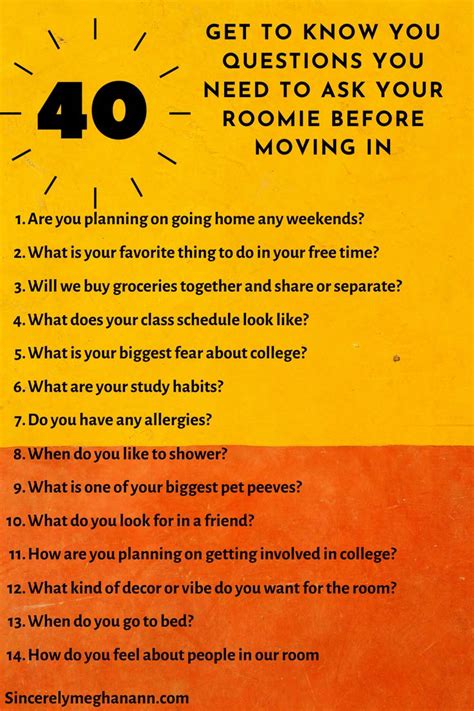Finding compatible roommates is like hitting the jackpot in the social lottery. To ensure that your living situation is a success, it’s essential to have open and honest conversations with your potential roommates. Here are some key questions to ask before signing that lease:

1. Lifestyle and Habits
- What are your sleep patterns? (Early bird or night owl?)
- How do you handle noise and chaos? (Loud music lover or peace-and-quiet seeker?)
- Do you have any pets? (Allergy concerns or pet-friendly preferences?)
- How do you share common spaces, like the kitchen and living room? (Clean freak or messy roommate?)
- Do you smoke or have any other harmful habits? (Health and safety considerations)
2. Financial Responsibilities
- How will we split the rent and utilities? (Evenly, proportionate to room size, or other arrangements?)
- Who is responsible for which household expenses? (Groceries, cleaning supplies, etc.)
- How do you prefer to pay rent and bills? (Cash, check, online transfer?)
- Do you have any financial concerns or limitations? (Be transparent to avoid potential conflicts)
3. Communication and Expectations
- How do you prefer to communicate about household matters? (Text, email, face-to-face?)
- What are your expectations for shared spaces and household maintenance? (Cleanliness, noise levels, etc.)
- How do you handle disagreements or conflicts? (Open communication, mediation, or avoidance?)
- Do you have any special needs or accommodations that we should be aware of? (Dietary restrictions, allergies, etc.)
4. Personal Space and Boundaries
- How do you feel about sharing personal spaces, like bedrooms and bathrooms? (Respecting privacy or open-door policy?)
- Do you have any items or areas that you need to keep private? (Lockable drawers, personal closets, etc.)
- What are your limits on overnight guests or inviting friends over? (Respecting shared spaces and privacy)
5. Other Considerations
- What are your interests and hobbies? (Finding common ground for potential bonding)
- Do you have any deal breakers or non-negotiables? (Smoking, loud noise, pets, etc.)
- What are your expectations for the overall living environment? (Friendly, social, or relaxed and private?)
- Are there any additional questions or concerns you have? (Open-ended question for further clarification)
Common Mistakes to Avoid
- Not asking enough questions: Assuming compatibility without exploring potential differences can lead to conflict down the road.
- Ignoring red flags: If a potential roommate raises concerns or has significant differences in habits or expectations, it’s best to proceed with caution.
- Not establishing clear boundaries: Lack of communication and unclear expectations can create unnecessary tension and resentment.
- Being overly flexible: While it’s important to be open-minded, it’s also crucial to stick to your own limits and expectations to avoid feeling taken advantage of.
- Rushing into a decision: Take your time, ask thorough questions, and trust your instincts before finalizing the roommate agreement.
Why It Matters
- Communication and clarity: Open and honest communication sets the foundation for a harmonious living environment.
- Mutual respect and understanding: By understanding each other’s expectations, habits, and boundaries, roommates can foster respect for individual differences.
- Shared responsibilities: Establishing clear financial and household responsibilities ensures fairness and accountability.
- Conflict prevention: Addressing potential conflicts proactively can prevent them from becoming major issues.
- Increased satisfaction and enjoyment: Compatible roommates create a more enjoyable and fulfilling living experience.
Benefits
- Reduced stress and tension: Clear expectations and open communication minimize misunderstandings and conflicts.
- Stronger relationships: Living with compatible roommates can strengthen the bond between individuals.
- Efficient household management: Shared responsibilities and clear boundaries contribute to a well-run household.
- Increased safety and security: Trustworthy and compatible roommates provide a sense of safety and security.
- Potential for lifelong friendships: Finding the right roommates can lead to lasting friendships that extend beyond the shared living space.
FAQs
-
Is it okay to ask about someone’s financial situation? Yes, it is important to address financial responsibilities upfront to avoid potential issues later on. Be respectful and sensitive when inquiring about financial matters.
-
What if we disagree on something? Disagreements are inevitable. Establish a method for resolving conflicts respectfully, whether it’s through direct communication, a third-party mediator, or compromise.
-
How do we handle unexpected situations? Set clear guidelines for how you will manage unexpected expenses or events, such as emergencies, lost keys, or damage to shared property.
-
Can we change the agreement later on? Yes, but it’s important to discuss any changes to the agreement with all roommates and put them in writing to avoid misunderstandings.
-
What if one roommate moves out? Establish a plan for the transition in case a roommate needs to move out, including how to share the remaining rent, utilities, and household responsibilities.
-
Is it important to sign a roommate agreement? Yes, a written roommate agreement outlines the expectations and responsibilities of each individual, providing a legal framework in case of any disputes.
